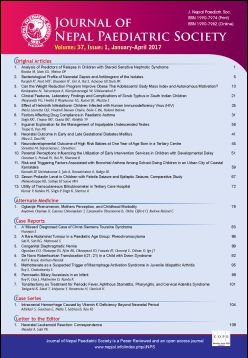Analysis of Predictors of Relapse in Children with Steroid Sensitive Nephrotic Syndrome
DOI:
https://doi.org/10.3126/jnps.v37i1.17432Keywords:
Nephrotic syndrome, Factors, RelapsesAbstract
Introduction: Children with idiopathic nephrotic syndrome (INS) are steroid responsive but have relapses in subsequent non-treatment period. The objective of the present study was to analyze the factors which could predict relapses in these children.
Material and Methods: Forty patients of INS aged 1-14 years of both gender were enrolled over one year period and followed for six months after treatment of initial episode of Nephrotic Syndrome.
Results: The median age of children was 4.5 years and male to female ratio 1.9:1. There were 24(60%) relapses and 16(40%) non-relapses. The relapses had significantly higher mean total leukocyte count, serum urea, potassium and cholesterol than non-relapses. It was also observed that the median age of onset in relapses was significantly lower than non-relapses (p<0.001). Also, the median time to response to steroid therapy was longer in relapses than non-relapses (p<0.001). Children who relapsed had infections at the time of relapse.
Conclusion: Thus, onset of disease in younger age group, late response to steroid therapy and presence of infections were found to be associated with relapses in these children.
Downloads
Downloads
Additional Files
Published
How to Cite
Issue
Section
License
Authors who publish with this journal agree to the following terms:
Authors retain copyright and grant the journal right of first publication with the work simultaneously licensed under a Creative Commons Attribution License that allows others to share the work with an acknowledgement of the work's authorship and initial publication in this journal.
Authors are able to enter into separate, additional contractual arrangements for the non-exclusive distribution of the journal's published version of the work (e.g., post it to an institutional repository or publish it in a book), with an acknowledgement of its initial publication in this journal.
Authors are permitted and encouraged to post their work online (e.g., in institutional repositories or on their website) prior to and during the submission process, as it can lead to productive exchanges, as well as earlier and greater citation of published work (See The Effect of Open Access).



